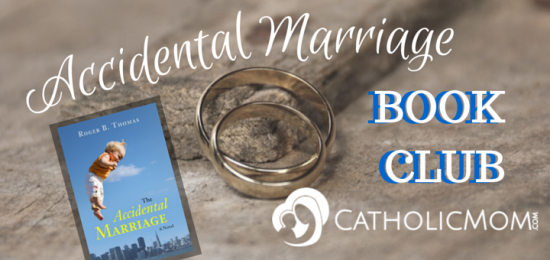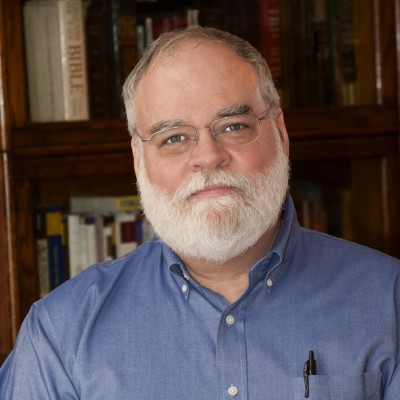Welcome to the Accidental Marriage Book Club! We're reading The Accidental Marriage, by Roger Thomas.

Fellow readers, this month we're happy to be sharing a new community reading experience as we will spend the next several weeks pondering the novel The Accidental Marriage, by Roger Thomas. I invite you to spend a few moments in the company of Roger, as he responds to my queries about the book, his family, his writing process and the challenging topics he takes on in this book. I think you'll agree with me when you begin the book that it is definitely one which lends itself to a good conversation about important issues. I look forward to sharing this reading experience with each of you!
Q: Please briefly introduce yourself and your family to our readers.
My day job is as a self-employed computer consultant here in Michigan, offering classes and doing programming and systems integration work.
What I consider my true career was raising six wonderful children alongside my wife Ellen. They have all now grown and are off about their own lives, which for most of them involves raising wonderful children of their own. We have twelve grandchildren so far, ten we can hold and two more due by summer. We’re fortunate enough to live close enough to most of them to be able to help when we can.
Q: This work of fiction takes on a very challenging yet timely topic. What prompted you to write The Accidental Marriage?
The original impetus came from a timely article on a website. It was written by a woman who was in a long-term relationship with another woman and was addressing the difficulties with bearing children. Of course, the article mostly focused on the costs and complexities of adoption, or using the various artificial means of conception such as IVF. But as a closing comment, the author made an almost offhand comment about how as a last resort, you could ask a gay friend to make a “contribution” – just be sure you had a good lawyer.
I pondered that article, and the shallow and casual manner in which it treated the depth and complexity of what happens when two people come together to bring a child into being. As I considered this, the characters of Scott and Megan began to form in my imagination, and soon their story was building around them.
Q: Why address this topic in fiction rather than non-fiction? What's accomplished in the telling of a story that makes your message unique and perhaps more open to acceptance?
A non-fiction discussion of some of these topics would necessarily involve an impersonal perspective. For instance, we can speak of how the image of God is present in all people, or how we all have a natural understanding of what is proper and true in human relationships. But this manner of addressing things is abstract, and though someone might comprehend them, it would be the rare person who would be touched and moved by them.
When you tell a story wherein the characters live out these realities, hopefully it will engage people at the heart level and help them to better see and appreciate them. These are more than just abstractions, issues that will show up on the final exam – they touch every corner of our lives and the very depths of our being. Even if we don’t know the formal definition of terms like “natural law” and “intrinsic evil”, we grapple with the reality daily.
Q: I'd imagine that it took some courage to tell this story. How did you spiritually arm yourself for the writing, publication and marketing process?
The writing wasn’t so bad, because that was just me and my legal pad. Now that the book is out there in this overheated cultural environment, it’s been a bit of a challenge. Ironically, the story as told isn’t intended to provoke much controversy – it’s about two friends, albeit ones who are living out a set of postmodern assumptions, who end up sharing their lives because of a baby and learning a lot about themselves. The main characters Scott and Megan begin the story as same-sex attracted people and end it the same way, though they’ve grown closer and more comfortable with each other.
But sometimes people don’t respond to what a story says, they respond to what they think the story says. What few negative responses I’ve gotten have been universally where people read things into the story and then respond to what they read in, not to what the story says. This will always happen, and though there’s part of me that just acknowledges that, the author part of me wants to say, “But you’re misunderstanding what’s being said here…” I just have to accept that some people will misunderstand, and there’s nothing that can be done about it.
Ironically, one response the book received was from a no-apologies, up-front gay blogger who reviews literature for the LGBT community. He loved it! He was able to see that this wasn’t a “pro-gay” or “anti-gay” story, it was just a story about people living and struggling and growing and learning to love. I can’t help but wonder if that’s what some of the negative reviewers can’t get past – because it involves “gay” people, they presume it’s going to be either “pro-gay” or “anti-gay” propaganda, and when it isn’t “pro-gay”, they’re disappointed.
Q: I'm not the first to guess that you might have hinted at a possible sequel. What are your hopes for both this work and a potential series based upon the lives of these characters?
Well, I’ve already written a couple stories that aren’t precisely sequels, but are distant follow-ons, wherein a grown-up Grace is one of the characters. I’ve been gnawing on a more immediate sequel, one that picks up where Accidental leaves off, but I’d have to get a good picture before starting that story. I’d want to do more than just write a tale that described the subsequent events, I’d want to get inside the characters and reveal them. That would be harder because I’d have to write more from a feminine perspective.
To be honest, the ending of The Accidental Marriage sort of took me by surprise. I knew the final chapter would primarily be about Scott and Megan reconciling and recognizing a lot of what they’d learned about themselves and each other, and I knew that they’d end by going to visit Scott’s mother, but the ending was as much of a surprise to me as to anyone. I realize it was kind of abrupt – so much so that it almost startled the editors – but the story told in Accidental had finished, and that’s where it landed.
Q: What's next for you personally and professionally?
As I mentioned, I’ve already written several more manuscripts, some of which are being considered by my publisher. Though two of these are more current stories, the most recent one is a long-held dream: a novelization of the journey of the Magi. Scriptural fiction is an iffy genre, often ending up with either characters that are simply modern people written into ancient settings, or two-dimensional characters who are woodenly pious. With the Magi of Matthew 2, there’s a lot of latitude because the Gospel says so little about them. They’re some of the most mysterious characters in all history. Who were they? What did they see that impelled their journey? Why was it so important for some pagan scholars to find the King of the Jews?
I tried to write a story that was true to the time, reflecting the understanding and outlook of the Hellenistic East. I got help from my brother, Dr. Dave Thomas, whose doctoral work involved researching Parthian culture. I tried to portray the Magi as I suspect they were – seekers looking for what they only partly understood but truly longed for. I don’t know if the manuscript will be accepted, but it’s not your usual Scriptural fiction. It has adventure, danger, intrigue, assassins, the Holy Family – and, of course, camels.
Q: Are there any additional thoughts or comments you would like to share with our readers?
One of my dearest hopes with The Accidental Marriage is that it would help everyone who reads it to see that all of us – all of us – bear the image of God and are searching for love. In our tense times when there’s a lot of acrimony and accusation, it’s easy to forget that “our struggle is not with flesh and blood” – that we are called to love everyone. I realize that there are some who insist that loving them means uncritically approving of everything they do, and anyone who doesn’t is a “hater”. We have to deal with those people as they come, but we can’t implicitly accept their premises. We can love everyone even if they don’t agree with us, even if they don’t indicate they’re going to change, even if they’re suspicious of us. Christ came to us when we were doing it all wrong, knowing full well that there would be many who wouldn’t accept Him. That didn’t stop Him from loving, and it shouldn’t stop us. It’s very likely that there is a Scott or a Megan in the lives of most of your readers. You are God’s message to them – not so much what you teach them (though it may involve that), but how you interact with them, how you accept them as a fellow image-bearer of God.
Next week, we'll cover Chapters 1-2. For the complete reading schedule and information about our Book Club, visit our The Accidental Marriage Book Club page.
Copyright 2015 Lisa Hendey
About the Author

Lisa M. Hendey
Lisa M. Hendey is the founder of CatholicMom.com, a bestselling author and an international speaker. A frequent radio and television guest, Hendey travels internationally giving workshops on faith, family, and communications. Visit Lisa at LisaHendey.com, on her Substack at LisaHendey.Substack.com, or on social media @LisaHendey for information on her speaking schedule or to invite her to visit your group, parish, school or organization. Find Lisa’s books on her Amazon author page.



.png?width=1806&height=731&name=CatholicMom_hcfm_logo1_pos_871c_2728c%20(002).png)
Comments